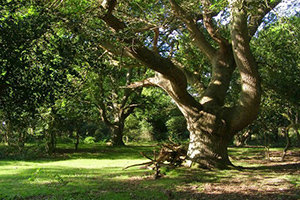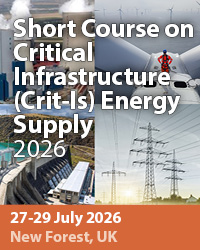The objective of this course is to describe the critical role of energy systems in modern infrastructure. Water and food supply, transportation, governments, administrations, health, internet, communication channels, manufacturing of goods, banking and other sectors essentially depend on energy. Without energy, all these infrastructures cannot be operated. Hence, the energy sector is today’s most critical infrastructure. A failure in parts of the energy sector results in negative impact on other infrastructure systems - and may result in situations of disaster.
Oil is still a key energy source for the world, however many countries are highly dependent on imports. In the 1970s, our planet experienced this slightly for the first time (OPEC supply reduction). Is it better today? What happens if a revolution takes place in Saudi Arabia or in Russia? Up to now, the UCTE, the Continental European electricity grid has been one of the most reliable grids in the world. Over the last three years, instabilities have been observed. Investigations uncovered that a break-down would result in war-like consequences for the population. Are there options to avoid such effects?
The course provides deep insight into the whole energy system, how it works, the nature of risks and vulnerability. The reasons for potential failures are highlighted as well as the consequences of such incidents and the dramatic impacts on the civilized world. The course will also cover methods of reducing existing risks and provide security approaches as well as measures of mitigation.
This course highlights the critical role of energy in our daily lives. Energy is essential for almost everything we rely on - without it, society would quickly regress to a pre-modern state. A lack of reliable energy means no ATMs, closed shops vulnerable to break-ins, halted subways and trains, disrupted telephone and mobile networks, non-operational gas stations, and no lighting in homes or on streets. Even hospitals can only function for a limited time without power before critical systems fail. And this is only part of the picture - the electricity grid itself is just one element of a much larger system.
A real-world example of this vulnerability was the massive blackout in Spain and Portugal, which affected around 50 million people. During the outage, some individuals were trapped in elevators for over 20 hours, and tragically, several lost their lives due to extreme summer heat and the absence of rescue.
For this reason, the course is not only valuable for students and individuals seeking to understand energy systems, but also for policymakers, government officials, and local administrators across the UK, Europe (including Spain), and worldwide.
Target Audience
The course not only discusses the technologies of the energy sector, but also deals with economic and social aspects as well as issues of the civil society. Maintaining a functioning of the Infrastructure Energy is a permanent interdisciplinary task. Who should attend:
- Engineers of all disciplines
- Scientists, researchers
- Economists
- Governmental and trans-national executives dedicated to energy supply and distribution systems
- Developers of Energy Master Plans
- Executives of administrations for civil protection, disaster prevention and management
- Administrators and electricity grid operators
- Security executives (anti-terror, technical and natural emergency response, etc.)
- Policymakers
- Students of all educational programmes
- Professionals interested in Critical Infrastructure Energy
Course Programme
Lectures will be presented on the following topics.
Day 1
- Critical Infrastructures: What makes a piece of infrastructure critical? Assets, benefits, dangers, risks, potential damages and losses. Interdependencies between Infrastructures. Special role of “Crit-Is (Critical Infrastructure) Energy”.
- Electricity from key Renewable Energies (RE): State-of-the-art technologies of Photovoltaic (PV) and Wind Energy Conversion (WEC). Basic equation, capacity factor. Environmental aspects. Pros and cons.
- Electricity demand and supply: Electricity grid as key element. How it works, role of consumer, role of generator. Reliability, grid stability and security of supply. UCTE and other electricity grids, comparison and evaluation. Impact of comprehensive failures of electricity grid.
- Traditional Electricity generation: State-of-the-art technologies of thermal power plants. Environmental aspects. Power vs. energy. Substitution of fossil and nuclear through PV and WEC, pros and cons. Status of German energy transition project.
Day 2
- Energy and economy: Access to electricity vs. poverty. World GDP and energy consumption, energy intensity of countries. Fixed and variable costs of power generation, cash flow cycle over the lifetime.
- Fossil fuels: Peak oil. World trading of energy commodities, energy exporters and importers, nature of risks and vulnerability. Energy import dependency of some countries. Special role of nuclear fuel. Oil price and world economy.
- Energy efficiency (EE) as "energy source": Energy intensity of manufacturing, potentials and limits of EE, technical & financial feasibility of EE. Advanced technologies of electricity application, co-generation, combined cycle, heat and other energy recovery. Case studies, real life examples.
- How to overcome volatile RE generation: Direct and indirect storage of electricity, batteries, hydro pumping PP, Wind to Gas (W2G) and others. Smart grids, Demand Side Management (DSM), technical feasibility, financial and social costs.
Day 3
- Biomass and other RE: Energy potential and exploitation of biomass. The conflict “food vs. fuel”, how to solve it, real life examples of sustainable biomass to energy systems. Others: Tidal and geothermal energies, solar up-draft, gasification, biogas generation and application, substitution of fossil natural gas by biogas. Evaluation (technology, financial feasibility) of RE systems.
- Environment and climate: Greenhouse effect, physics, CO2 in atmosphere and emissions by country, other greenhouse gases, world climate observations, long term change of temperatures. Fracking and LNG. Carbon capture and storage.
- Nuclear energy: Status of utilisation worldwide, basic physics of nuclear power, liquid drop model, chain reaction and radioactivity, nuclear waste. Fukushima accident, decay heat, Zr-H2O reaction, lessons learnt. Today’s state-of-the-art reactor technology. New concepts for increasing the amount of nuclear fuels and minimising both, quantity and hazard, of nuclear wastes. Advanced modern SMR’s (Small Modular Reactors) and Dual fluid Reactor.
- Options for future energy systems: Potential of hydropower and other RE systems, challenge of off-shore wind farms, storage of energy. Concentrating Solar Thermal Power (CSTP) technology, fusion reactor. Evaluation of Crit-Is Energy: maintaining reliability, reduction of risks, security of supply, minimisation of vulnerability, mitigation of impacts of failures.
Course Presenter
Prof Helmut Koerber, Dipl-Physiker (MSc), Dr (PhD) of Engineering is a Senior Consultant and CEO of APC Angewandte Physik (Applied Physics) Consulting AG, Baar, Switzerland, and a lecturing professor at University of Furtwangen (HFU), Black Forest, Germany, previously also at HTW University of Berlin. He has been advising companies, governmental authorities and NGOs in matters of energy efficiency, risk and safety, prevention of industrial accidents as well as environment protection - in all cases financial feasibility analyses included. His main research focuses on biomass to energy technologies, Critical Infrastructures (Crit-Is) with an emphasis on security of electricity supply, and core melting in light water reactors providing fundamental insight into the Fukushima accident long before it occurred.
In his many years of working all around the globe (North and Latin America, Europe, Mid-East, South and Southeast Asia, Pacific, Africa), Helmut was able to gain comprehensive professional experience through a wide variety of projects (power plants, chemical, textile and agro industry, waste incineration, refineries, mining) as well as through training of postgraduates. He is a highly successful lecturer for both engineers and non-technical professionals. As such he has provided more than 100 courses.
Prof Koerber is a licensed expert of “Environment Protection and Safety Technology” corresponding to §29a/b BImSchG (Bundes-Immissions-Schutz-Gesetz, = German Federal Act for Emission Protection), and member of KAS (Kommission für Anlagensicherheit), the advisory body to the German government on safety of industrial plants. He is author of several books and of teaching materials for lecturers. He has published widely in journals, conference proceedings, as well as government and industry reports.
Location
 The New Forest is one of the UK's most popular tourist destinations and offers many attractions all year round, including picturesque forest villages as well as beautiful scenery. It is located in Southern England, spreading over 150 square miles of Hampshire. The New Forest was established as a royal hunting ground by King William I, and by the 14th century, the land was being used to produce timber for the shipbuilding industry on the south coast. Today, after nearly 1000 years, the forest is still Crown property and is administered by the Forestry Commission. Since the reign of King William I commoners have been given the right to graze their livestock, normally ponies, cattle and pigs, on Forest land where they wander freely. In the New Forest, the well-being of the animals and the special needs of the countryside are a priority. The Forest is unarguably recognised as one of the most unique and important wilderness areas in Western Europe and, because of this, it is now a National Park.
The New Forest is one of the UK's most popular tourist destinations and offers many attractions all year round, including picturesque forest villages as well as beautiful scenery. It is located in Southern England, spreading over 150 square miles of Hampshire. The New Forest was established as a royal hunting ground by King William I, and by the 14th century, the land was being used to produce timber for the shipbuilding industry on the south coast. Today, after nearly 1000 years, the forest is still Crown property and is administered by the Forestry Commission. Since the reign of King William I commoners have been given the right to graze their livestock, normally ponies, cattle and pigs, on Forest land where they wander freely. In the New Forest, the well-being of the animals and the special needs of the countryside are a priority. The Forest is unarguably recognised as one of the most unique and important wilderness areas in Western Europe and, because of this, it is now a National Park.
Venue and Accommodation
The course will take place at the Wessex Institute at Ashurst Lodge located in the New Forest, an outstanding National Park that borders the South Coast. Ashurst Lodge is an ideal venue for conferences, courses and seminars. The participants can benefit from an excellent standard of accommodation in various hotels or bed and breakfasts in the area. The surroundings are equally appealing to those who enjoy walking, horse riding, cycling, sailing and fine landscapes.
For more information on how to find Ashurst Lodge and to arrange accommodation during the courses please use the information provided on the Contact Us page.



 Wessex Institute
Wessex Institute